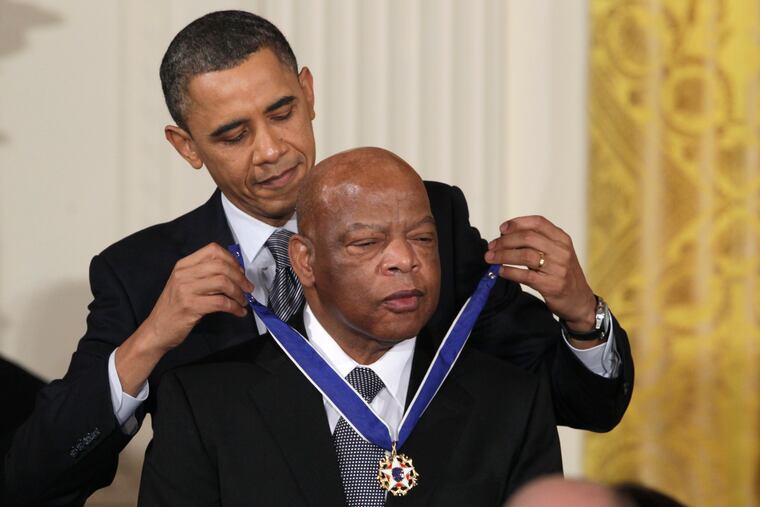How I’ll honor the memory of John Lewis | Solomon Jones
Even after all John Lewis gave, racism is still killing Black people today.

In grainy images from the civil rights movement, we see a young John Lewis clad in tie and trench coat, his face fixed in the earnest expression of a man who knows he is walking into trouble.
“Good trouble,” he would later call it. The kind of trouble that resulted in beatings and arrests. The kind of trouble that could have very well cost Lewis his life. The kind of trouble that ultimately changed America for the better.
Lewis, who died Friday from pancreatic cancer, beat the odds more than once in a life marked by good trouble. He beat the odds as a teenager, when he wrote to civil rights leader the Rev. Dr. Martin Luther King, Jr., to request help in getting into college. King not only responded. He sent Lewis a round-trip ticket from Troy, Ala., to Montgomery, Ala., to participate in a civil rights march. Lewis beat the odds again when he marched into history by crossing Selma’s Edmund Pettus Bridge in a quest for Black voting rights.
» READ MORE: ‘I’ve got a lion heart’: Philly remembers John Lewis, congressman and civil rights icon
Now, even in death, Lewis must beat the odds again. He must not be reduced to a hashtag, and although renaming the Edmund Pettus Bridge for Lewis would be an honor, such gestures are not enough. John Lewis, who marched for voting rights on a day that would later become known as Bloody Sunday, was bigger than that. He was braver than that, and for anyone who doubts that truth, consider the fact that Lewis was arrested some 40 times while challenging racist laws in the South. Consider that he risked his life while taking part in Freedom Rides to challenge segregation on buses. Then, after considering all that, think about what Lewis was facing in the days before he marched across an Alabama bridge in an audacious bid for Black voting rights.
It was early March 1965, and the air in Selma was thick with tension. It had been that way since Feb. 18, when civil rights activist Jimmie Lee Jackson was beaten and shot by Alabama State Trooper James Bonard Fowler during a peaceful demonstration in a nearby town. Jackson died in a Selma hospital on Feb. 26, just days before Lewis and others would cross a bridge named for a Confederate general. The trooper who murdered Jackson would not be charged for 45 years, and the troopers who confronted Lewis on the Edmund Pettus Bridge likely knew they wouldn’t be charged, either.
Marching for voting rights under those conditions required a certain kind of gumption. It required the courage of one’s convictions. It required guts.
Unlike those who march today, Lewis knew there would be no lawsuits after he was teargassed and beaten. Nor could he expect that officials would be fired or forced to resign in the wake of state-sanctioned violence. In fact, if Lewis had died on that bridge while marching for Black voting rights, his killer would’ve likely gotten away with murder, because Black lives did not matter.
And the only reason Black people can freely protest today is because John Lewis and other men and women like him risked their very lives to make it so.
» READ MORE: John Lewis, in his own words, during visits to Philadelphia
John Lewis spent 44 days in a Mississippi jail so that I could travel without the burden of segregation. Lewis was abused and arrested at lunch counter sit-ins so that I could eat at the restaurant of my choice. Lewis was beaten so badly on the Selma march that his skull was cracked. He endured that last indignity so that I could vote.
It is with those truths in mind that I make this solemn promise: I will vote no matter what obstacles are placed in front of me. Not just because racism was killing Black people when Lewis was fighting against it. I will vote because even after all Lewis gave, racism is killing Black people today.